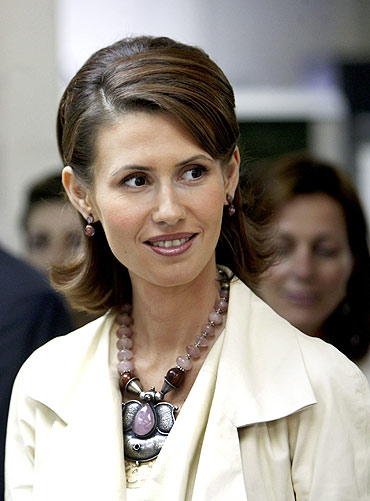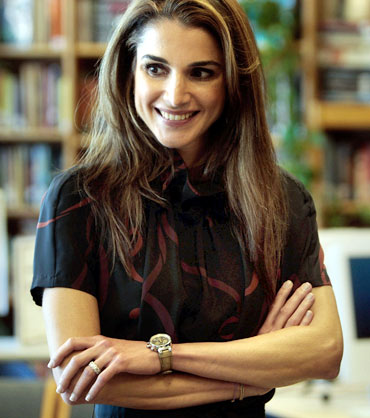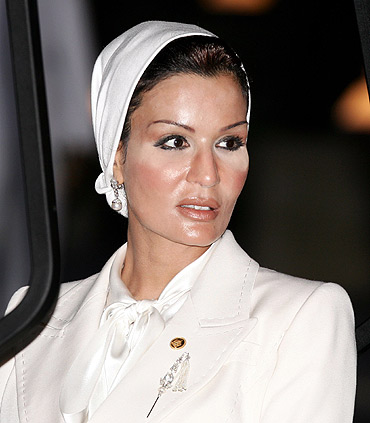 | « Back to article | Print this article |
Arabia's better halves: The beauty and brains
For years, Arab's first ladies were completely absent from public life. But today things have changed drastically. From social work and intellectual reforms to sharing the responsibility of nation building with their husband's, the women have enchanted the Arab world with their grace and elegance. And leading from the front are the three dynamic young ladies -- Syria's Asma al-Assad, Jordan's Queen Rania and Qatar's Sheikha Moza.
Syria's First Lady Asma al-Assad:
Charming, well-spoken and intelligent Syria's First Lady Asma al-Assad made quite a statement as she toured the world with her husband President Bashar al-Assad when he took over the reins from his father a decade ago. Her dark-brown eyes, wavy brown hair and grace make her one of the most energetic first ladies of today. But it's her penchant for change that makes her a cut above the rest. The dynamic first lady has been working for the younger generation in the country ever since she married Bashar al-Assad in December 2000.
The 35-year-old has been working towards bringing about a change in the mindset of six million Syrians under 18 and encouraging them to engage in what she calls "active citizenship."
In 2005, she founded Massar, which is part of The Syria Trust for Development, a national non-profit to promote learning techniques to inform, involve and inspire young people across the country. The Syria Trust for Development oversees Massar as well as her first NGO, the rural micro-credit association FIRDOS, and SHABAB, which aims at brushing up business kills of the youth.
In addition to her work with NGOs, the Syrian first lady has toured underdeveloped areas in the country bringing hope and encouraging developmental projects. In 2007, she was the first senior Syrian to visit the Neirab Refugee Camp, established for refugees in 1948. For 59-years the Neirab Camp has been the most-highly populated refugee camp in Syria. From Neirab, she went to the Jabal al-Hoss to inspect the United Nations development programmes of rural social development.
And part from this is her culture mission. In her work, Asama supports, guides and initiates projects for the better protection and understanding of Syria's unique heritage. She also takes a lead role when public and private sectors, non-governmental agencies and international partners need to combine for large-scale heritage initiatives such as the current transformation of all Syria's museums and cultural heritage sites.
With all of this and more, Asma's attempt to put a modern face on Syria remains relentless.
Click on NEXT to read further...
Arabia's better halves: The beauty and brains
Jordon's Queen Rania:
She captured the attention of the world with her glamour when she married Jordon's King Abdullah II (then the prince) in 1993. She has been ranked as the third most beautiful woman in the world by Harper's & Queen Magazine. She made world headlines by appearing on the Oprah Winfrey Show in 2006, breaking stereotypes of Arab women.
Jordon's Queen Rania's stunning good looks and impeccable fashion sense were and will always be the talking point, but today she is known to the world for lot more than just her than her beauty. With her deep commitment towards progress in the Middle East she has emerged as an excellent spokesperson for the region. Since becoming queen -- the youngest in the world in 1999 she toured the world speaking on behalf of Jordan and defending women's rights in the Arab world.
In Jordan, her work concentrates on the calibre and quality of education for Jordanian children, while abroad she advocates for global education.
In November 2000, in recognition of her commitment to the cause of children and youth, the United Nations Children's Fund invited Queen Rania to join its global leadership initiative. She works alongside other world leaders, including former South African president Nelson Mandela, in a global movement seeking to improve the welfare of children.
She has stated that an essential aspect of education is to equip young people with the necessary skills to perform well in the workplace. At the 2008 World Economic Forum in Davos, she launched the 'Empowering One Million Arab Youth by 2018' campaign.
Domestically, Queen Rania has launched, championed, and given patronage to several initiatives in education and learning. Rania is the chairperson of Jordan's first interactive children's museum. In April 2008, she launched Madrasati (My School), a public-private initiative aimed at refurbishing 500 of Jordan's public schools over a five-year period.
In 2009, the Forbes magazine ranked her within the world's 100 most powerful women and she used her status to correct what she sees as misconceptions in the West about the Arab world. Today, she is seen promoting her agendas online with a strong presence on YouTube, Facebook and Twitter.
Rania balances her multiple roles with elan part from playing her part as a mother of four, which she perhaps enjoys more than being a queen.
Arabia's better halves: The beauty and brains
Qatar's Sheikha Moza:
The second of the three wives of Qatar's Sheikh Hamad bin Khalifa Al Thani, Sheikha Moza bint Nasser Al Missned is something of a cult figure in the fashion blogosphere. And according to Qatar government officials, she does not even employ a stylist. British designer Julien Macdonald claims that Emir of Qatar's wife has more global fashion resonance than any first lady since Jackie O.
But it is not her wardrobe choices that catapulted her to number 74 in the Forbes' 2010 list of the world's most powerful women.
The sheikha has been championing the cause of education for more than a decade now. She has been a high-profile figure in her nation's politics and society, actively involved in Qatar's government. Her first and greatest feat was the Education City, founded on the outskirts of Doha, a NGO that houses five top United States varsities. She is also the president of the Supreme Council for Family Affairs in Qatar, and vice-president of the Supreme Education Council. She was a driving force behind the Al Jazeera Children's Channel, in addition to the 24-hour news service, to promote education among Arab children.
Her reforms in education are not restricted to Qatar alone. She is a special envoy special envoy for UNESCO on Basic and Higher Education.
That's not all. She works for establishing a center for embittered women in the Arab World, building non-Muslim places of worship in Qatar, and introduced the now-world famous Doha Debates to Qatar.
Among all of this she makes time for her family. She has played a huge role in pushing her husband towards modern thinking. A mother of seven, she tries to provide her children with maximum parental care and keeps them away from media attention as far a possible.
Fashionable and poised the sheikha is quite an icon in the Middle East.


